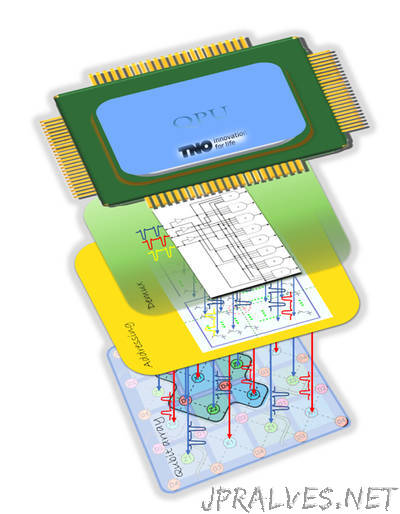
“Future quantum computers promise exponential scaling in computing power with linearly increasing number of qubits. However, harnessing this power is challenging due to the complexity of controlling a large number of qubits simultaneously. A solution to this problem has been engineered by Richard Versluis, principal scientist at TNO, Leo DiCarlo, associate professor at TU Delft and postdoc Stefano Poletto with support of colleagues from TNO and TU Delft at QuTech and Intel. They invented a control methodology for fault-tolerant quantum computing based on a basic building block of eight qubits with a fixed set of control hardware. This basic building block can be reproduced to large arrays of qubits, without any increase or changes to the control hardware.
With this new method, qubit error correction and logical operations, needed to execute complex algorithms on large scale quantum computers, are now made possible on any number of qubits. They published their work in Physical Review Applied.
Plenty of room at the bottom
Nobel-prize winning physicist Richard Feynman famous quote ‘there is plenty of room at the bottom’ indicated that there is a whole world to explore at the quantum scale. He was one of the first to note that the complexity to model quantum mechanical systems could also be turned into a powerful resource: since it takes many parameters to adequately model coupled quantum-mechanical systems, one can look at coupled quantum-mechanical systems as systems that can store and manipulate huge amounts of data. Since that time, people have come up with clever algorithms for quantum computers that will outperform regular supercomputers on various problems, such as code cracking, data finding and data analysis and determining properties of chemical substances. Such algorithms require millions of qubits, and the quest to scale the number of controllable qubits is challenging.
Large-scale quantum computers require smart hardware
A major challenge for quantum computers, which now consist of a handful of qubits, is their scalability. In order to execute quantum algorithms with a reasonable success rate, you need millions of qubits in order to overcome the inherent instability of qubits and correct errors in the system. Up to now, qubit control systems typically got bigger and more complex with the growing number of qubits. This is not a major problem in experimental quantum chips with a small number of qubits, but no concepts were available to control the thousands to millions of qubits, while at the same time performing error correction on the qubits.
Any number of qubits controlled by a single set of hardware
The researchers from QuTech, a collaboration founded by TU Delft and TNO, established a solution to this scaling challenge for superconducting qubits. The solution uses control hardware with the size of a small bookcase, to control a basic set of eight qubits. By copying and pasting the eight qubits on the chip, the same single control system can control any number of qubits individually, from 8 to 8 million or more, and execute the gates required for quantum error correction. This enables quantum computer programmers to execute quantum algorithms on any number of qubits. The next goal at QuTech is to apply this method to realize a 17-qubit quantum processor with error correction in an ongoing project. This would constitute a world-record number of qubits with both individual control and error correction.”
